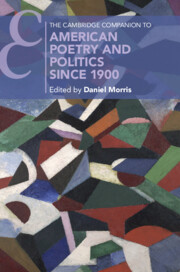Book contents
- The Cambridge Companion to American Poetry and Politics since 1900
- The Cambridge Companion to American Poetry and Politics since 1900
- Copyright page
- Contents
- Notes on Contributors
- Acknowledgments
- Introduction
- Chapter 1 The Space of Public Memory
- Chapter 2 Poetry and Propaganda
- Chapter 3 Depression-Era Poetics and the Politics of How to Read
- Chapter 4 The Politics and Poetics of Revolution
- Chapter 5 Wallace Stevens, Stanley Burnshaw, and the Defense of Poetry in an Age of Economic Determinism
- Chapter 6 The Line of Wit
- Chapter 7 US Poets on War and Peace
- Chapter 8 Institutions of American Poetry
- Chapter 9 African American Political Poetries
- Chapter 10 Our Terribly Excluded Blue
- Chapter 11 Poetry and the Prison Industrial Complex
- Chapter 12 “Oh Say Can You See”
- Chapter 13 The Political Resonances of Hip Hop and Spoken Word
- Chapter 14 Language as Politics in Twentieth- and Twenty-First-Century American Poetry
- Chapter 15 Renovating the Open Field
- Chapter 16 Transcultural Agency
- Chapter 17 Ecopoetry Now
- Chapter 18 The Politics and History of Digital Poetics
- Index
- Cambridge Companions to …
- References
Chapter 16 - Transcultural Agency
Published online by Cambridge University Press: 27 April 2023
- The Cambridge Companion to American Poetry and Politics since 1900
- The Cambridge Companion to American Poetry and Politics since 1900
- Copyright page
- Contents
- Notes on Contributors
- Acknowledgments
- Introduction
- Chapter 1 The Space of Public Memory
- Chapter 2 Poetry and Propaganda
- Chapter 3 Depression-Era Poetics and the Politics of How to Read
- Chapter 4 The Politics and Poetics of Revolution
- Chapter 5 Wallace Stevens, Stanley Burnshaw, and the Defense of Poetry in an Age of Economic Determinism
- Chapter 6 The Line of Wit
- Chapter 7 US Poets on War and Peace
- Chapter 8 Institutions of American Poetry
- Chapter 9 African American Political Poetries
- Chapter 10 Our Terribly Excluded Blue
- Chapter 11 Poetry and the Prison Industrial Complex
- Chapter 12 “Oh Say Can You See”
- Chapter 13 The Political Resonances of Hip Hop and Spoken Word
- Chapter 14 Language as Politics in Twentieth- and Twenty-First-Century American Poetry
- Chapter 15 Renovating the Open Field
- Chapter 16 Transcultural Agency
- Chapter 17 Ecopoetry Now
- Chapter 18 The Politics and History of Digital Poetics
- Index
- Cambridge Companions to …
- References
Summary
In “Pollen Fossil Record,” the final section of Myung Mi Kim’s Commons (2002), a poem titled “duration” evokes the elusive process by which a lyric poem inventories the material traces of perception, of expression, and of history. The task of the lyric, always seemingly impossible, is to translate the multivalent, multidirectional vectors of living into the shape of a sound, a line, an imaginary articulation. In the poem’s closing lines, the speaker offers us an operational definition of transcultural agency that I would like to use as a guiding principle for this chapter: “The poem may be said to reside in disrupted, dilated, circulatory spaces, and it is the / means by which one notates this provisional location that evokes and demonstrates / agency – the ear by which the prosody by which to calibrate the liberative potential of / writing, storehouse of the human / To probe the terms under which we denote, participate in, and speak of cultural / and human practices – / To mobilize the notion of our responsibility to one another in social space” (Kim 111). What would it mean to treat accountability, as opposed to the loaded pressures of intimacy or the unmanageable demands of consensus, as the key paradigm of relation within a commons? And how have American poets variously participated in this “responsibility to one another in social space” across the twentieth and twenty-first centuries? Indeed, this is no small feat in a historical period marked by ceaseless empire-building, massive immigration, global warfare, expanding routes of trade and commerce, ecological collapses, the rise of mass incarceration, and increasing wealth disparities – phenomena that have unevenly impacted people of color throughout the United States and led many to cling more strongly to a sense of community based in self-recognition. And yet multiethnic American poets have continually shown us that thinking beyond the ideologies of modern conditions of colonialism, systemic racism, and global capitalism happens through a shared sense of responsibility to alternative modes of assembly empowered by dialogic discourse and cross-cultural exchange. If we think of poems as formal microcosms of the cultural practices and political networks of marginalized communities, we can begin to see how transcultural agency depends as much on dissonance as it does on harmony. Any poem that holds the potential to mediate encounters, at times reciprocal and at other times violent, that transgress national, political, and linguistic borders calls on us to become sonically attuned to multiple sites of exchange, traversal, and substitution at once. For Kim’s speaker, agency denotes neither imposing force nor instrumentalist control but rather an “ear” that is sensitive to the “disrupted, dilated, circulatory” elements of culture – the ability, in other words, to flow with currents of meaning, of value, and of relation as they ripple across space and time.
- Type
- Chapter
- Information
- Publisher: Cambridge University PressPrint publication year: 2023



